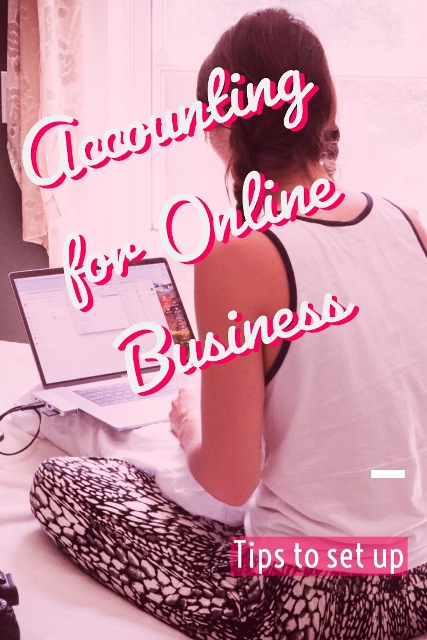I know, you don’t want to be bothered with the accounting side of your business and rather be creative or serve your customers. Unfortunately, it’s the part of business you cannot ignore as it makes good business sense to know what your numbers are. This post is a basic breakdown of the most important accounting items to check off to avoid problems later.
With these insights I hope to help you put all your ducks in a row, because when your business accounting is taken care off, you can fully dive into the creative or service side of your business. The information covered below came from a newsletter I received a few weeks ago and I’ll list the link below, so you can get all the details.

The basics for setting up your business properly
1. Choose a structure and get your business license
Depending on the type of business you’re in, your choices are: Sole Proprietor, LLC or S-Corp. As a Sole Proprietor you are your business, the boss and everything else. It’s the easiest and most affordable way to get started with a business, but one disadvantage is that you will be personally liable for any debts.
An LLC or Limited Liability Corporation may be a better choice, because you (and other owners) can have personal liability protection under this structure. You’ll need a business name, and more paperwork is involved that can be completed with online resources or a service provider like a CPA or lawyer. This option costs more to set up.
As a small business you can set up your business as an S-corporation to get some of the benefits of larger corporations. Your business is a separate entity and taxpayer but comes with favorable tax rates and additional legal protection. This form will cost a lot more to get started, but if you want the coverage of a corporation it will be your best option. Set up requires professional help from a CPA or attorney.
2. Separate your finances
No matter which structure, separate your personal and business finances and be sure to track your expenses. It’s very easy to use business income for personal expenditures and vice versa, but believe me, this can quickly cause a big mess. Especially if you don’t mark your receipts and track your expenses immediately. The IRS will want to know the details, so be ahead of the game and make your expense tracking stress-free come tax time. See more expense tracking details here.
That brings us to getting a separate bank account for your business. Stress will go: “poof” because now you will only have business expenses coming out of one account, which will simplify your life and that of your accountant if you use one. This by the way, is a requirement when your business is set up as an LLC or S-Corp.
3. Bookkeeping helps to see your financial picture
Bookkeeping is important for tracking your income and expenses, so you can get a picture of your financial status. Are you making or losing money? You can do your own bookkeeping if you have the inclination, otherwise hire a bookkeeper to do this for you. If this person doesn’t provide tax services, you can hire an accountant for the taxes. Find out what their fees are to help you make a decision. Another option is to go online. There are a lot of tools available but my favorite for bookkeeping is FreshBooks, so check them out. (If you use my link, I may earn a commission without any extra costs to you, should you decide to buy)
Save time with FreshBooks, the #1 cloud accounting specialist for small business owners.
4. Employees & contractors, the difference
If business is booming, you probably have help in the form of employees or contractors. Do you understand the difference between the two? Employees are on payroll and work either in your office or according to your instructions and processes, using your equipment. Here’s where the use of an accountant comes in handy, because they can help with payroll withholding and taxes. A contractor works for you independently and is responsible for their own taxes. At the end of the year, you will provide a 1099 for any contractor who provided services of $600 and more.
5. Pay your taxes
Paying taxes depend on the type of business you have. Sales tax, if you’re selling products in a shop or online should be collected from the customer and paid to the IRS each month. Payroll tax needs to be withheld from your employees’ paycheck and paid to the government on a monthly or quarterly basis. Check with your tax specialist.
6. Insurance for your business
Insurance, the other unfavorite topic for almost anyone I know… Do you need it? This also depends on the type of business you have and the country you live in. Some forms of insurance are general or professional liability insurance, property insurance, worker’s compensation, etc. Here’s an article about the types of small business insurance you may need. Talk to your account or an insurance agent to get customized information for your own business needs, for when you will need it in the future. You never know…

Get your piece of mind
The last two items on this list put the most fear in me. We all need to pay our taxes, and in the U.S. insurance is not optional, whether it’s when driving a car or running a business. That’s how far my understanding goes. Combined with the fact that there are constant changes in the law we can’t keep up with, my husband (also a business owner) and I have always used an accountant (CPA) to do our taxes. Our accountant also helped to set up our businesses to cover all our bases. Call it peace of mind…
It doesn’t mean you can’t apply for your own license or do your own taxes, especially if your savvy with minute details. Just consider where you save the most, time or money. Sometimes it’s both…
Good accounting, less worry
When you take care or these nitty-gritty details, you will have one less thing to worry about when tax time rolls around. Or when you need to get a loan and are asked for financial details of your business. Most importantly, having a good idea of how your business is doing will help you grow your business by cutting costs or looking for opportunities to grow your business.

If this post helped you understand why business accounting plays a significant role for your business, then it served its purpose! Want to share your tips or experiences with accounting or your accountant? Let us know in the comments below.
Would you like to read more about this topic, visit the “A Better Lemon Stand website” to educate yourself.
Good luck and keep growing your business!
